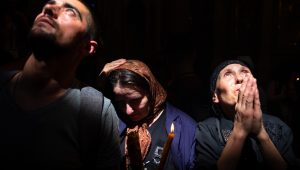Both Israel and the United States have religious origins.
The Land of Israel is often referred to as the Promised Land because the land was promised by God to Abraham and his descendants.
“On that day the Lord made a covenant with Abram, saying, ‘To your descendants I have given this land, from the river of Egypt as far as the great river, the river Euphrates.’” (Genesis 15:18)
Even modern Israel’s Declaration of Independence alludes to divine origins. The Declaration begins with the following sentence:
“ERETZ-ISRAEL [Hebrew – the Land of Israel] was the birthplace of the Jewish people. Here their spiritual, religious and political identity was shaped. Here they first attained to statehood, created cultural values of national and universal significance and gave to the world the eternal Book of Books.”
Similarly, one of the leading pioneers of the English colonies that became the United States, Governor John Winthrop, wrote the following upon his ship’s departure from England about the purpose of the early English settlers:
“For we must consider that we shall be as a city upon a hill. The eyes of all people are upon us. So that if we shall deal falsely with our God in this work we have undertaken, and so cause Him to withdraw His present help from us, we shall be made a story and a by-word through the world.”
Certainly, for both Israel and the USA religion has played a major role. Modern Israel was established as a safe haven for Jews who had suffered persecution based on their religion and ethnicity. Israel is often known as the nation of the Jewish people. The First Great Awakening in the US (early 18th century) was a huge Christian religious awakening among the people and is said to have been a factor that led to the American Revolution. The Second Great Awakening (early 19th century) was an even larger religious awakening that led to the abolition of slavery.
And yet the founding documents of both modern nations stipulate their democratic character as allowing freedom of religion.
Both nations created checks and balances to prevent the abuse of power, and both nations established protection of individual rights in their controlling documents. Israel’s Declaration of Independence states the following:
“THE STATE OF ISRAEL will be open for Jewish immigration and for the Ingathering of the Exiles; it will foster the development of the country for the benefit of all its inhabitants; it will be based on freedom, justice and peace as envisaged by the prophets of Israel; it will ensure complete equality of social and political rights to all its inhabitants irrespective of religion, race or sex; it will guarantee freedom of religion, conscience, language, education and culture; it will safeguard the Holy Places of all religions; and it will be faithful to the principles of the Charter of the United Nations.”
Similarly, the First Amendment to the US Constitution begins with, “Congress shall make no law respecting an establishment of religion, or prohibiting the free exercise thereof…” The founding fathers of the United States wanted to avoid the religious wars common throughout European history. Therefore they made it clear that this new nation was not a religious state, including a Christian one, while affording full protection of the freedom of worship to all.
The history of both Israel and the USA reveals the wisdom of these founding documents. Both countries have prospered and generally permitted a wide variety of faith expressions. However, in recent years religious nationalism has increased to the point of threatening the very foundations of these countries.
One of the big differences between the two nations is the structure of their respective governments and the number of political parties involved in government. Israel is a parliamentary democracy where multiple political parties are represented in its legislature, the Knesset. The United States is a federalist system with an electorally separate executive branch, headed by the President or governor (in the case of states), and a Congress (or a state legislature), split between two houses. Throughout most of US history, usually only two parties were represented in government, currently Republicans and Democrats.
Of the multiple parties comprising the Knesset, religious parties in Israel are very common and have been represented in the Knesset since the nation’s founding. Simplistically, they can be divided into two general camps. The first camp is comprised of haredim or ultra-Orthodox. Normally, this camp seeks care for their own, making sure their particular religious communities have certain rights and privileges. The second camp is a religious nationalist camp, which seeks to expand Israel’s borders to so-called Biblical boundaries. As these two camps have grown and expanded their influence, their actions are shaking the democratic foundations of the country. Both camps tend to object to the role of Israel’s judiciary in society. This is due to Israel’s Supreme Court striking down different pieces of legislation important to both camps. Consequently, the current Israeli government is, among other things, pursuing legislation stripping the judiciary’s role in reviewing legislative acts, thus potentially threatening individual rights in the country through a so-called “tyranny of the majority.”
While religion has played a historic role in politics and government in the US, there’s nothing like Israel’s religious parties. However, a new phenomenon has arisen in the US over the past forty years. The Republican Party has increasingly become a quasi-religious party, representing the largely white Evangelical Christian community in the US.
Beginning with the election of Ronald Reagan in 1980 and over the years, to the support of Donald Trump in the 2016 and 2020 elections, white Evangelical support for Republican candidates has grown to over 80% of Evangelical voters. Many, if not most, of these voters are frustrated with the changing cultural values in the US and seek to restrict further cultural change through legislation and judicial activism. They see themselves as protecting the Christian values of the past. They were particularly drawn to Trump’s campaign themes of “Make America Great Again.” They saw him as a warrior for their values. Since he campaigned against what he termed, “the deep state,” alluding to corruption throughout government, when he claimed the 2020 election was stolen, many Christians, among others, believed him and descended upon the US Capitol at the January 6 riot to block the transition of government. Many still believe the 2020 election was stolen, which has undermined Americans’ faith in government, election integrity and in democracy generally.
While religion and religious values can play important roles in society, the history of religion and politics is a sordid one. When a religion becomes dominant in a state, minority rights are trampled. Consider the experience of Jews in Christian Europe during the Middle Ages, or Christians and Jews living today in Iran. Religious nationalism can alter a society and at the present time is a danger to Israel and the United States.
Jamie Cowen is currently a law partner in Cohen and Brosh Law Office, Tel Aviv, Israel. Former rabbi, Tikvat Israel Messianic Congregation, Richmond, Virginia. Former chief counsel of a US Senate Subcommittee. Author of the book, How Politics Has Distorted the Gospel.
















Sorry I don‘t follow the logic of this article. Both Christian and Jewish religions protect the rights of the minorities, but todays non religious parties seem to reject and penalise anyone who doesn‘t agree with them !
I see the present governments in US and Europe as the least tolerant in my memory, penalising all (including minorities) who don‘t agree with its atheistic agenda !
I understand the viewpoint of Jamie Cowen, as Christians in Europe regrettably persecuted and killed Jewish people for many centuries. However, the decisions and actions of the United Nations in recent years seem to prove that their “human wisdom” is not as trustworthy as the founders hoped for. A big difference between the “religious nationalism” in Israel and that of US is that the former is founded on the God-given Scripture, while the latter is driven by Gentile Christians’ political agenda. What is missing among the elected religious leaders in Israel is their attention to such God’s command as Ezekiel 47:21-23.